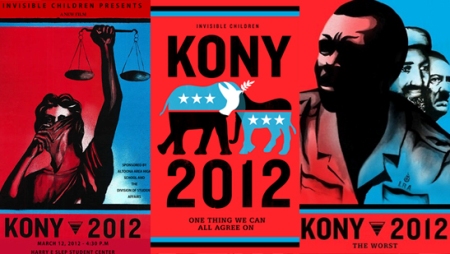#Kony2012 e Invisible Children: una campagna critica da diversi punti vista
 Questa mattina mi sveglio e scopro che anche l’Italia ha iniziato a vedere e condividere Kony 2012, un documentario virale di Invisible Children, organizzazione umanitaria statunitense, realizzato con ottime tecniche cinematografiche – i fondatori dell’ong sono film-makers – e sapiente combinazione di storytelling con e per i social media che in 4 giorni ha raggiunto
Questa mattina mi sveglio e scopro che anche l’Italia ha iniziato a vedere e condividere Kony 2012, un documentario virale di Invisible Children, organizzazione umanitaria statunitense, realizzato con ottime tecniche cinematografiche – i fondatori dell’ong sono film-makers – e sapiente combinazione di storytelling con e per i social media che in 4 giorni ha raggiunto 26 milioni 49 milioni di visualizzazioni su YouTube.
Sebbene anch’io sia piuttosto esaltata per il fatto che un video che parla di Africa – di Uganda, venga condiviso sulle bacheche e timeline di tutto il mondo (il sospetto che sia stata Rihanna a diffondere il virus non mi ha ancora abbandonata), in rete si trovano considerazioni piuttosto critiche sulla campagna Kony 2012.
Perché?
1. Per la reputazione di Invisible Children e il loro approccio alla cooperazione internazionale:
– The group is in favour of direct military intervention, and their money supports the Ugandan government’s army and various other military forces. [Visible Children, 7 marzo 2012]
– It presents a pretty simple and powerful idea: we identify a prime candidate for global public enemy number one, we get his name to the entire world with viral marketing and then leverage that to get policymakers to go after him. [Joseph Kony and Crowdsourced Intervention, 7 marzo 2012]
– Invisible Children si rifiuterebbe di collaborare con il Better Business Bureau, un’agenzia che indaga sulla natura etica delle associazioni. [Koni 2012: cos’è e perché dovrei dargli o meno i miei soldi, 8 marzo 2012]
2. Perché Joseph Kony non è più in Uganda:
– It would be great to get rid of Kony. He and his forces have left a path of abductions and mass murder in their wake for over 20 years. But let’s get two things straight: 1) Joseph Kony is not in Uganda and hasn’t been for 6 years; 2) the LRA now numbers at most in the hundreds, and while it is still causing immense suffering, it is unclear how millions of well-meaning but misinformed people are going to help deal with the more complicated reality. [Guest post: Joseph Kony is not in Uganda (and other complicated things)]
3. Perché gli ugandesi chiedono che si parli in modo diverso del loro paese:
– To call the campaign a misrepresentation is an understatement. While it draws attention to the fact that Kony, indicted for war crimes by the International Criminal Court in 2005, is still on the loose, it’s portrayal of his alleged crimes in Northern Uganda are from a bygone era. [Acholi Street. Stop #Kony2012. Invisible Children’s campaign of infamy, 7 marzo 2012]
– I am a story teller and i know the danger of a single story . It is something many people can easily ignore especially if we are outsiders to the story. [>> guardare il video collegato Kony2012; My response to Invisible Children’s campaign, 8 marzo 2012]
– “What that video says is totally wrong, and it can cause us more problems than help us,” said Dr Beatrice Mpora, director of Kairos, a community health organisation in Gulu, a town that was once the centre of the rebels’ activities. [Joseph Kony 2012: growing outrage in Uganda over film, 8 marzo 2012]
4. Perché è necessario porsi delle domande sui limiti dello storytelling dei diritti umani:
– “[Kony2012] has opened up a fascinating and complicated discussion not just about the Lord’s Resistance Army and instability in northern Uganda and bordering states, but on the nature of advocacy in a digital age“, scrive Ethan Zuckerman nel suo blog.
“Social media vs simplistic narratives on Africa. It was about time!”, twitta Iginio Gagliardone dall’Etiopia. Ma il documentario di Invisible Children funziona proprio perché offre una spiegazione semplice di una realtà complessa e, secondo Zuckerman, questo è anche il suo limite: “Kony is a uniquely bad actor, a horrific human being, whose capture will end suffering for the people of Northern Uganda. If each of us does our part, influences powerful people, the world’s most powerful military force will take action and Kony will be captured. (…)” Jason Russel e i suoi colleghi “genuinely believe that the key to arresting Kony is raising awareness and pressuring the US government. I think, however, that they are probably wrong.”
Infine, secondo Jeune Afrique, ecco chi sta veramente guadagnando dalla diffusione virale di Kony 2012:
En relayant dans le monde les agissements du « Messie sanglant » et en sensibilisant l’opinion internationale, l’ascension mystérieuse de Joseph Kony sur Twitter aura donc fait quelques heureux. Invisible Children d’abord, les États-Unis ensuite, Wikipédia enfin, dont la page consacrée au leader de la LRA a dû être très utile à des millions d’internautes ces derniers jours
[ LRA : Joseph Kony, superstar du web | Jeuneafrique.com , 9 marzo 2012]
Personalmente mi piacerebbe avere l’opinione di una ong che lavora sul campo per capire le reali conseguenze di questo documentario sul territorio ugandese. Ho provato a muovere i miei contatti, aspetto risposte. Per ora questo post rimane in progress.
Scusaci, ma i commenti sono disabilitati per questo post.


Pingback:I bambini invisibili contro Joseph Kony in Uganda